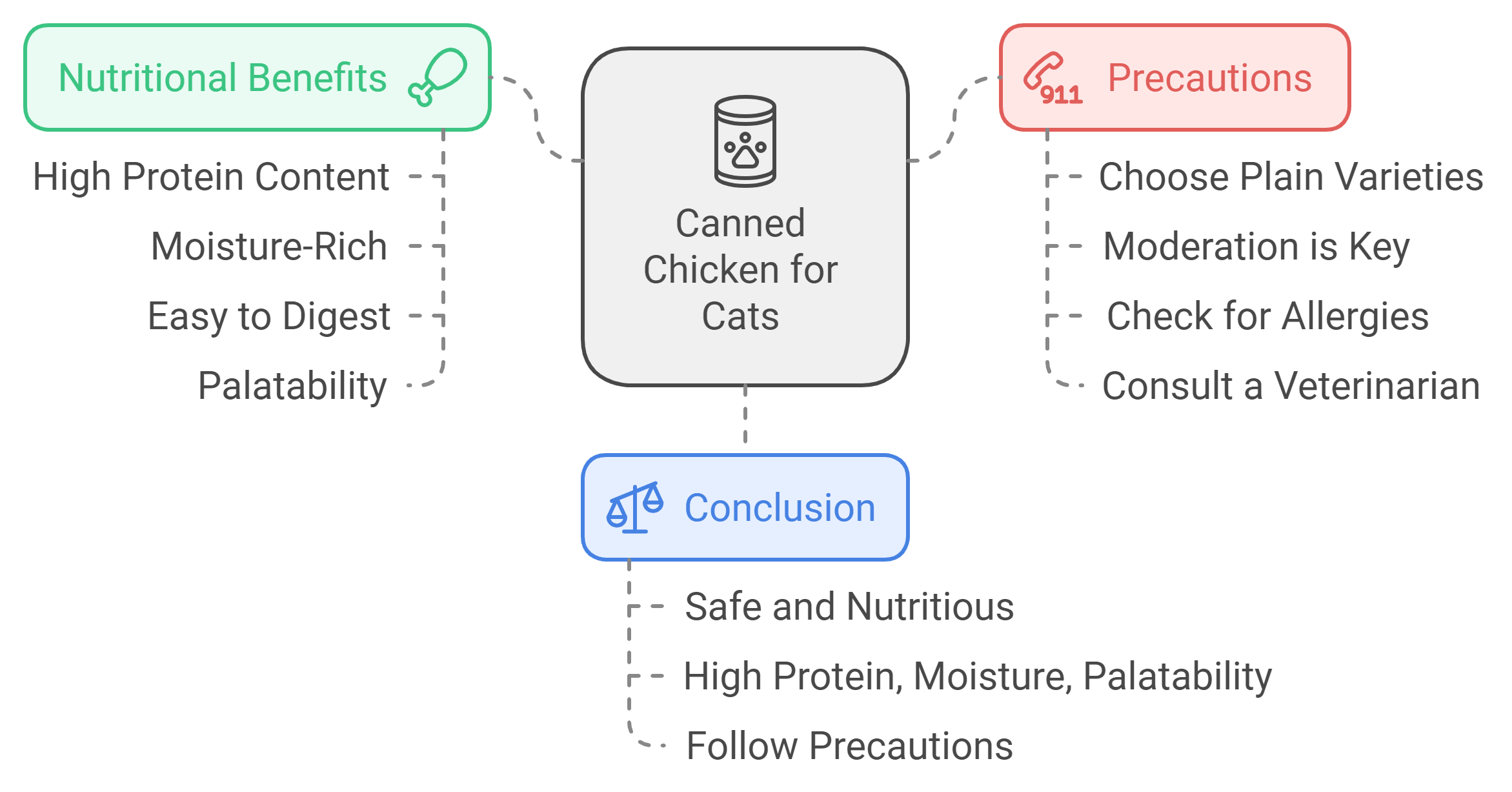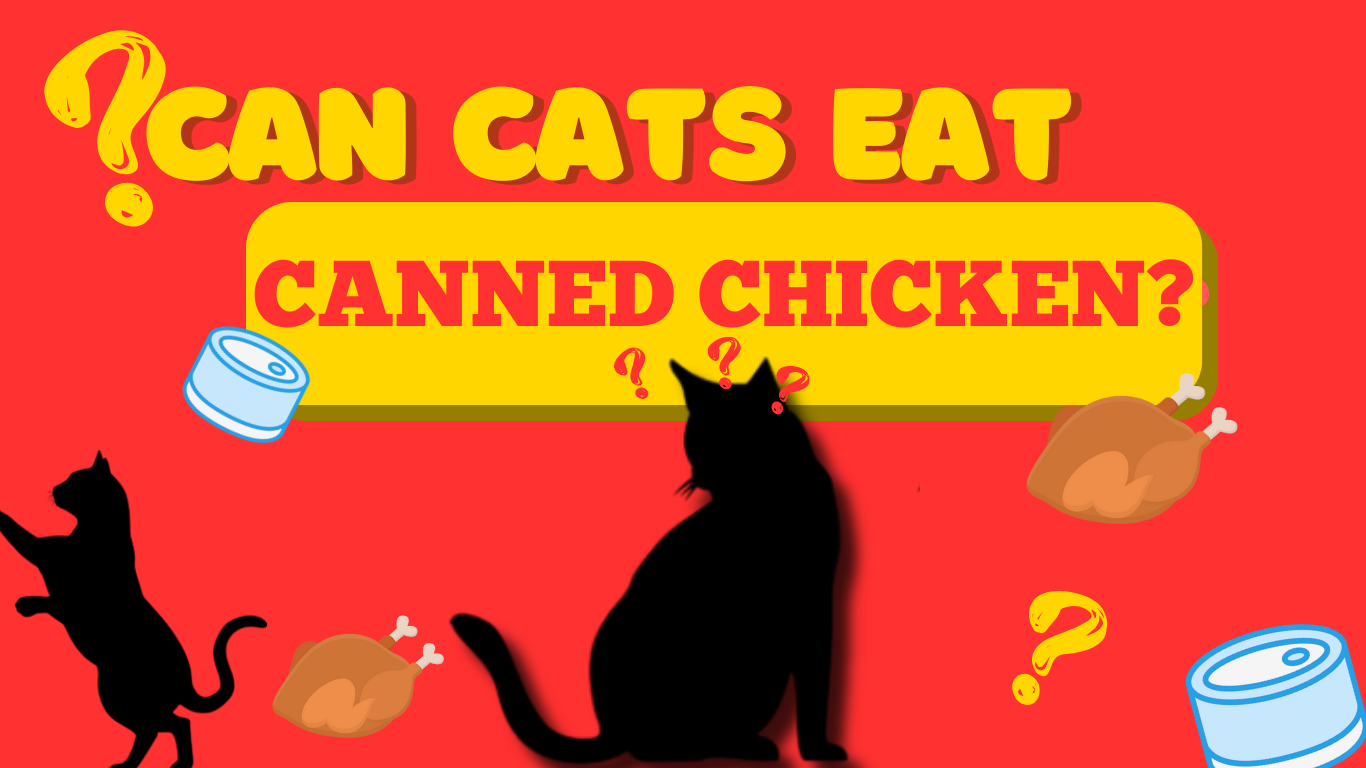We all know that felines being carnivores love having chicken. There is a zero chance that you put the canned chicken in front of your cat and she will refuse it.
But should she eat canned chicken?
Canned chicken generally is taken as a safe meal for cats if it’s given as a treat on special occasions only which means…..
Feeding canned chicken to your kitten as a complete meal on daily basis can be risky. You can’t just trust taste palates of your cat so let’s dig into the topic to find the hidden truth:

Can Cats Eat Canned Chicken?
The Truth about Feeding Canned Chicken to Cats
We already have told you that canned chicken isn’t something you should be feeding your cat on a daily basis. But we all have that one person in our life who feeds weird human food to his cat. Sometimes, it’s because the cat wants it but in either case, it’s way worse than canned chicken.
If you have nothing to feed to your cat and your cat is starving, you must think about grabbing a canned chicken and giving it to your kitty. Everything should be alright because it’s nothing more or less than a complete protein diet. Right?
Well, that’s not true!
We would never say that canned chicken is the worst thing you can ever feed to your cat because it has (both) pros and cons. So, let’s learn everything about the canned chicken before deciding anything because we also don’t want your cat to get sick:

What does Canned Chicken Contain?
Usually, when we mention canned food in general, health concerns always come into play due to several reasons like the use of chemicals for preservation.
One thing you need to know is that canned doesn’t give proper immunity and energy elements due to the same reason. Immense processing and use of preservatives make chicken less effective as a food source.
But yes, the canned chicken comes in handy when you don’t have time to cook, so, there should be no harm in feeding it to your cat once in a while.
To understand more about what exactly canned food contains, have a look at the table below:
| Nutrients | Without Broth (One Can) | With Broth (One Can) |
| Calories | 231 | 234 |
| Total Fat | 10 (g) | 11 (g) |
| Saturated Fat | 2.8 (g) | 3.1 (g) |
| Sodium | 603 (mg) | 714 (mg) |
| Protein | 32 (g) | 31 (g) |
| Carbohydrates | 1.1 (g) | 0 (g) |
| Cholesterol | 63 (g) | 88 (mg) |
| Iron | 1.6 (mg) | 2.2 (mg) |
| Potassium | 191 (mg) | 196 (mg) |
Health Benefits of Canned Chicken for Cats
People don’t usually want to have a look at this side of feeding canned chicken to your cat. Hence, to make you aware of both (wrong and right) sides of canned chicken for cats, we decided to start with the health benefits of canned chicken for your cat:
Protein
The main and primary component of any kind of chicken is protein. Protein is another name for muscle development in felines as carnivores. In other words, cats can’t live without protein because it is the most essential nutrient for a cat’s body. Yes, canned food isn’t the best source of protein for felines but still, it has enough amount of protein to make the tummy of your pet full.
Healthy Fats
Healthy and unsaturated fats like omega-3 fatty acids are the second most important part of the diet of felines (after protein). These kinds of fatty acids help kittens perform various tasks every day.
Essential Vitamins and Minerals
Canned food doesn’t usually have a high volume of potential vitamins and minerals. However, some micronutrients that a feline requires for growth are present in canned chicken. Vitamin A, vitamin B, vitamin C, and vitamin D are on top of the list of nutrients that are abundant in canned chicken.
The benefits of these micronutrients are:
- Vitamin A for eyesight especially that super power (night vision).
- Vitamin B and vitamin C help sustain a perfect immune system.
- Vitamin D for the growth and maintenance of the strong teeth and bones of your friend.
Other than these vitamins, canned chicken also offers other vital nutrients in the form of magnesium, calcium, and zinc.
Related: Can You Feed Biscuits To Your Cat?
Why Feeding Canned Chicken to Your Cat Might Be a Wrong Decision?
Now, it’s time to move toward the dark side of feeding canned chicken to your cat. Talking about reasons why people around you might be stopping you from doing it is important for you to make any decision.
High Amount of Sodium
Not just canned chicken but also (almost) every canned food has an extra amount of salt to preserve food for a long time. That extra amount of salt isn’t that harmful for humans but cats might get in trouble with that.
We already know that ordinary salt (or table salt) includes sodium. Right? Sodium isn’t the right thing to feed to your friend.
Have you ever noticed that whenever you eat food with an excessive amount of salt, your tongue gets dry and you become more thirsty than usual? This thing in cats is quite similar to humans and sodium is the culprit.
In humans, it’s not a big deal because we take it normally and drink another glass of water. But cats don’t really like drinking water. Hence, if you feed them food with high amounts of sodium, dehydration can occur and it might attract other severe issues like kidney problems and diarrhea as well.
Exceedingly Processed Food
In today’s world, a huge portion of human food consists of processed food. Whether it is milk or bread, everything has gone through some sort of processing for good and bad reasons. But canned food (especially chicken) is processed a little more than usual food items.
Our stomachs are strong enough and are built in such a way that they can digest even overly processed food, but our cute little friend’s bellies aren’t made that way. They can easily get sick by eating overly processed food.
Presence of Saturated Fat
In the presence of beneficial fatty acids, you can’t deny the fact that canned chicken also has saturated fat which is harmful to your pet.
The bad effects of saturated aka unhealthy fats for your feline are:
- Increase in cholesterol level (it can lead to heart diseases).
- Stress on joints (it’s unwanted if you have an elderly cat).
Does Canned Chicken Cause Obesity in Cats?
One of the biggest debates these days among cat owners is ‘Does canned food (specifically chicken cause obesity in cats?’
Although, this question doesn’t have a straightforward answer, if you still want a one-liner, ‘Yes’ is what you’ll get. The main reason for obesity in cats is high-fat or high-calorie food but still, canned chicken can be seen as a culprit only because of saturated fats that are present in it. Canned chicken isn’t that of a big deal when obesity is the topic. It means that canned chicken will only be a bad choice if you feed it the wrong way (daily).
Feeding Canned Chicken to Your Cat (The Only Right Way!)
Here are some guidelines for feeding canned chicken to your cat:
- Always try to buy low-sodium chicken
You already know what capabilities sodium possesses and why it is harmful to your little feline. Right? So, try your best to find low-sodium canned chicken so that your cat can enjoy canned chicken more.
- cook it the right way (if it isn’t already)
Mostly, canned chicken is cooked but if it isn’t, you are allowed to cook it. But never use garlic or onion while cooking it as they both are harmful for cats.
- Don’t feed it every day
Due to several reasons like presence of sodium and risk of obesity, feeding canned chicken daily to your cat is always discouraged.
- Visit the vet if there’s something wrong
If you face any problem with your cat’s health even after taking care of all guidelines, you must visit the vet immediately because some canned chicken companies secretly put a harmful ingredient and never write it in the ingredients section.
Note: These guidelines are compulsory to follow. Keep an eye on them at any cost, otherwise, you might face problems in the future.
FAQs
Should I Rinse Canned Chicken Before Feeding My Cat?
Yes, you should!
It’s a good practice to rinse canned chicken as it helps you get rid of some amount of excessive sodium.
Should I Feed My Cat Raw Canned Chicken?
The shortest answer to this question is ‘NO’!
Everywhere in movies, shows, cartoons, and commercials, it is shown that raw meat is a feline’s favorite food. But in reality, raw chicken can have several bacteria and germs that can harm your cat. So, you should ask your cat’s vet about a certain canned chicken before doing anything.
How long can Canned Chicken be used for My Cat?
This is a question every pet parent should ask because usually, people don’t bother seeing whether canned food (even cat food) is expired or not. So, read the expiry date from the can before feeding it to your friend. However, you can extend the expiry date up to a week by keeping it in fridge.
Can Cats Eat Canned Chicken with Broth?
It depends but usually, vets don’t recommend it!
Even when you find canned chicken with a low content of sodium, if it has broth, there are chances that sodium will be in there to a huge extent. That’s why broth isn’t recommended by experts.
To wrap things up
Can my cat eat canned chicken? We hope you are no longer in search of answers to this question because you now know that canned chicken is okay for your feline if not fed daily. In case of any confusion, read the FAQs we have compiled for you. If any FAQ didn’t answer your question, ask us in comments.

